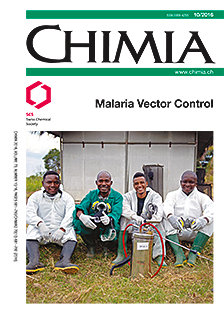Evaluation of Commercial Agrochemicals as New Tools for Malaria Vector Control
DOI:
https://doi.org/10.2533/chimia.2016.721Keywords:
Adult mosquito screening, Aedes, Agrochemicals, Anopheles, Malaria, Vector controlAbstract
Malaria is a vector-borne and life-threatening disease caused by parasites that are transmitted to people through the bites of infected female Anopheles mosquitoes. The vector control insecticide market represents a small fraction of the crop protection market and is estimated to be valued at up to $500 million at the active ingredient level. Insecticide resistance towards the current WHOPES-approved products urgently requires the development of new tools to protect communities against the transmission of malaria. The evaluation of commercial products for malaria vector control is a viable and cost effective strategy to identify new malaria vector control products. Several examples of such spin-offs from crop protection insecticides are already evidencing the success of this strategy, namely pirimiphos-methyl for indoor residual sprays and spinosad, diflubenzuron, novaluron, and pyriproxifen for mosquito larvae control, a supplementary technology for control of malaria vectors. In our study the adulticidal activities of 81 insecticides representing 23 insecticidal modes of action classes, 34 fungicides from 6 fungicidal mode of action classes and 15 herbicides from 2 herbicidal modes of action classes were tested in a newly developed screening system. WHOPES approved insecticides for malaria vector control consistently caused 80–100% mortality of adult Anopheles stephensi at application rates between 0.2 and 20 mg active ingradient (AI) litre–1. Chlorfenapyr, fipronil, carbosulfan and endosulfan showed the expected good activity. Four new insecticides and three fungicides with promising activity against adult mosquitoes were identified, namely the insecticides acetamiprid, thiamethoxam, thiocyclam and metaflumizone and the fungicides diflumetorin, picoxystrobin, and fluazinam. Some of these compounds certainly deserve to be further evaluated for malaria vector control. This is the first report describing good activity of commercial fungicides against malaria vectors.Downloads
Published
2016-10-26
Issue
Section
Scientific Articles
License
Copyright (c) 2016 Swiss Chemical Society

This work is licensed under a Creative Commons Attribution-NonCommercial 4.0 International License.
How to Cite
[1]
M. Hoppé, O. F. Hueter, A. Bywater, P. Wege, P. Maienfisch, Chimia 2016, 70, 721, DOI: 10.2533/chimia.2016.721.







